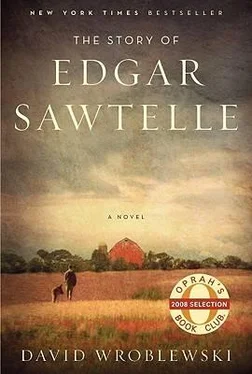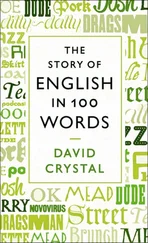He knew for certain that Forte was following as he’d hoped only on the second night. They’d walked all day picking at the fish, a particle for himself, a particle for Essay, a particle tossed on the ground. Essay rooted for turtle eggs, but that season was past. A few stray blueberries hung on bushes, cooked in their skins. They stopped midday along a lake and Edgar stripped and walked into the water and stood until his skin cooled and the fresh mosquito bites stopped itching. An egret lifted out of the reeds near the lake’s edge, white and archaic. It glided across the water and settled near the shore a safe distance away and cawed its objection to his scaring the fish. But the egret was wrong. Edgar ate only the fish that remained in the satchel, reheating them over the fire. God, he was tired of eating them.
He set the remainder of their cache near the edge of the firelight. He suspected it was a bad idea. The satchel was greasy from the fat in the bodies of the fish. Perhaps every bear in the region knew where they were by now, but so would Forte, and he was right about that. When he woke in the morning, the stray raised his muzzle and gazed at him over the glowing char of the fire. He lay still. Essay stood and circled to Forte and nosed him and both dogs circled back. Forte extended his neck and scented him, legs trembling. He stroked Essay under the chin, then let his hand pass to Forte.
When he stood, the dog backpedaled. With his one shredded ear, he looked at once comical and cagey. Edgar turned his back and gathered his things. When he looked around, Forte was gone. As was Essay.
NOW ALMONDINE OCCUPIED HIS THOUGHTS. He hadn’t seen her for two months or more and suddenly it felt like he’d been severed from some fundament of his being. At the end of the next day or the day after that, they would be joined again. Perhaps she would have forgotten his crimes, for which he wanted more than anything to atone. Everything that had happened to him since he’d left made him think of her. Others dreamed of finding a person in the world whose soul was made in their mirror image, but she and Edgar had been conceived nearly together, grown up together, and however strange it might be, she was his other. Much could be endured for that. He also knew that she was old, and he had squandered some portion of their time circling in the woods, blind, confused, stopping and starting with only vague notions of what to do. Without the strangest kind of intercession he might never have seen her again. Perhaps only when he’d become an old man would he realize how reduced he’d been by that decision, how withered he’d become, away from her.
He’d left in confusion, but his return was clarifying. So much of what had been obscure while he faced away was now evident. No sooner had he walked away from that cove by the lake than the need to go home possessed him. He understood the rightness of Tinder’s decision, and Baboo’s. Henry was a fretful person, filled with doubts and worries, but he was faithful as well. Edgar wondered what would have happened to them if Tinder had injured his foot a mile farther along. So much of the world was governed by chance. If they had left Henry’s house a day earlier, they might have been in Canada that very moment, maybe even at Starchild Colony. Life was a swarm of accidents waiting in the treetops, descending upon any living thing that passed, ready to eat them alive. You swam in a river of chance and coincidence. You clung to the happiest accidents-the rest you let float by. You met a good man, in whose care a dog would be safe. You looked around and discovered the most unusual thing in the world sitting there looking at you. Some things were certain-they had already happened-but the future could not be divined. Perhaps by Ida Paine. For everyone else, the future was no ally. A person had only his life to barter with. He felt that way. He could lose himself to Starchild Colony or trade what he held for something he cared about. That rare thing. Either way, his life would be spent.
These were his thoughts as he walked the edge of a marshy clearing. Across the way, Essay bounded and turned and nipped at Forte, who followed her, suddenly awkward and puppylike. At length, from Forte’s ineptitude and lurching clumsiness, a fight broke out between them. But it was a mock battle, and soon Essay gallivanted over to Edgar, ignoring the lout.
They slept far from water or any landmark familiar to him. He made a fire for warmth and let it bank. Forte lay watching, curled beneath a chestnut sapling. That night Edgar crossed the lighted circle to sit near the stray and work the burrs out of his coat. When he finished, he stroked the animal along his withers. Forte scented his wrist. He remembered those nights in the garden, Forte silvered in the moonlight and quivering beneath his hands. Then Edgar returned to his side of the fire. His last thought before he slept was that he was glad not to be eating fish, even if it meant going hungry.
The next morning they set off eastward, tracing shadows back to their source again and again. Essay and Forte disappeared. When he saw Essay again, her muzzle was stained red with fresh blood. He knelt beside her and ran his fingers along her gum line and ruff and legs but the blood was not hers. Forte was nowhere to be seen.
They came to the clearing filled with fire-scarred trees where they had stopped the very first night, where the owls had turned to watch them. He began to run. The sumac blazed red where earlier it had stood like green parasols. When he looked down, Essay was by his side.
The old logging trail appeared. They came to the fence line set in the middle of the creek. The water was no more than a trickle and the fence post he’d uprooted sat cockeyed in the silt and dirt. He stepped into the water and lifted the barbed wire. Essay passed beneath almost without breaking stride. On the far side she shook herself needlessly and waited. The creek water slipped over the sand and rocks. He stood waiting for Forte. After a time he decided the dog would find his own way to cross, if he was going to cross at all. He pushed the fence post over and stepped across the wires, not bothering to restore it as he walked back onto their land.
WHEN SHE WASN’T SLEEPING ALREADY SHE LAY IN THE SHADE and waited for sleep to return. In slumber everything was as it had once been, when they were whole and he ran beside her, pink and small-limbed and clumsy. Those were nights when the timbers of the house had breathed for them and no sand had yet worked into her joints. No search for him was necessary. In her dreams, he was there, always, waving bachelor’s buttons for her to smell, unearthing oddities she was required to dig from his clenched hands for fear he’d found some dangerous thing. Not so in the waking world, which held nothing but an endless search.
All her life she had found whatever she had been asked to find and there had only been one thing ever. Now he was truly lost, gone away, crossed into another world, perhaps, some land unknown to her from which he could not return. The closet was as puzzled as she, the bed silent on the question. It was not out of the question that he had learned the secret of flight, and the window was not too small for him to pass through. There, sleeping on his bed at night, she would be the first to see when he returned. Old as she was, she still had questions to ask him, things to show him. She worried about him. She needed to find him, whole or changed, but know in any case, and she would taste the salt of his neck.
She had learned, in her life, that time lived inside you. You are time, you breathe time. When she’d been young, she’d had an insatiable hunger for more of it, though she hadn’t understood why. Now she held inside her a cacophony of times and lately it drowned out the world. The apple tree was still nice to lie near. The peony, for its scent, also fine. When she walked through the woods (infrequently now) she picked her way along the path, making way for the boy inside to run along before her. It could be hard to choose the time outside over the time within. There was still work to do, of course. The young ones in the barn knew so little and she had taught so many before. It hardly seemed worth trying when she was asked, though she did.
Читать дальше
Конец ознакомительного отрывка
Купить книгу












